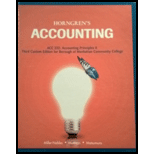
Concept Introduction:
Return on investment is a profitability ratio that represents the percentage return on the investment made. It is calculated by dividing the Net Income by the Average total assets. The formulas to calculate the ROI are as follows:
Or
Profit Margin Ratio:
Profit Margin Ratio is a profitability ratio that represents the percentage income earned on the sales. It is calculated by dividing the Net Income by the Sales. The formulas to calculate the Profit margin is as follows:
Asset Turnover Ratio:
Asset Turnover Ratio is an efficiency ratio that represents the sales earned on the average assets invested in the business. It is calculated by dividing the Sales by Average total assets. The formulas to calculate the Asset Turnover Ratio is as follows:
Residual Income (RI):
Residual Income is the income earned over and above the expected
Requirement-1:
To calculate: ROI for each Division
Requirement-2:
To calculate: Profit Margin Ratio for each Division
Requirement-3:
To calculate: Asset Turnover Ratio for each Division
Requirement-4:
To calculate: ROI using the Expanded ROI formula
Requirement-5:
To calculate: The Residual Income (RI) for each division and recommendation
Requirement-6:
To describe: Some factors that management considers when setting the minimum target rate of return
Want to see the full answer?
Check out a sample textbook solution
Chapter 24 Solutions
ACCOUNTING PRINCIPLES 222 5/16 >C<
- Need help with this question solution general accountingarrow_forwardBryan owns a fitness center called Peak Performance Gym. During the past year, Bryan sold his facility to purchase a larger building with a parking lot. He received sales proceeds of $140,000 from the buyer. He paid a sales commission of $7,500 to his broker. The building had an original cost of $115,000 and had accumulated depreciation for tax purposes of $18,250. What is Bryan's realized gain or loss on the sale?arrow_forwardIf the average age of inventory is 120 days, the average age of accounts payable is 80 days, and the average age of accounts receivable is 100 days, the number of days in the cash flow cycle is: A. 140 days B. 120 days C. 100 days D. 140 daysarrow_forward
- Financial Accountarrow_forwardA manufacturing company reports the following financial data: • Current Assets: $12,500 • Accounts Receivable: $6,200 • Cash: $3,500 • Inventories: $2,400 • Sales (all credit): $30,000 • Cost of Goods Sold: $24,000 • Total Current Liabilities: $11,500 Compute the Current Ratio, Quick Ratio, Inventory Turnover, Fixed Asset Turnover, and Debt Ratio.arrow_forwardGive me solution this question general accountingarrow_forward

 AccountingAccountingISBN:9781337272094Author:WARREN, Carl S., Reeve, James M., Duchac, Jonathan E.Publisher:Cengage Learning,
AccountingAccountingISBN:9781337272094Author:WARREN, Carl S., Reeve, James M., Duchac, Jonathan E.Publisher:Cengage Learning, Accounting Information SystemsAccountingISBN:9781337619202Author:Hall, James A.Publisher:Cengage Learning,
Accounting Information SystemsAccountingISBN:9781337619202Author:Hall, James A.Publisher:Cengage Learning, Horngren's Cost Accounting: A Managerial Emphasis...AccountingISBN:9780134475585Author:Srikant M. Datar, Madhav V. RajanPublisher:PEARSON
Horngren's Cost Accounting: A Managerial Emphasis...AccountingISBN:9780134475585Author:Srikant M. Datar, Madhav V. RajanPublisher:PEARSON Intermediate AccountingAccountingISBN:9781259722660Author:J. David Spiceland, Mark W. Nelson, Wayne M ThomasPublisher:McGraw-Hill Education
Intermediate AccountingAccountingISBN:9781259722660Author:J. David Spiceland, Mark W. Nelson, Wayne M ThomasPublisher:McGraw-Hill Education Financial and Managerial AccountingAccountingISBN:9781259726705Author:John J Wild, Ken W. Shaw, Barbara Chiappetta Fundamental Accounting PrinciplesPublisher:McGraw-Hill Education
Financial and Managerial AccountingAccountingISBN:9781259726705Author:John J Wild, Ken W. Shaw, Barbara Chiappetta Fundamental Accounting PrinciplesPublisher:McGraw-Hill Education





